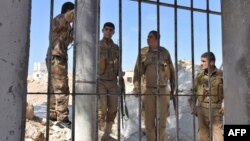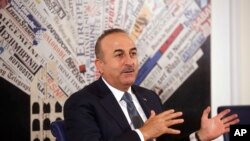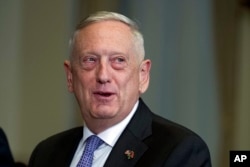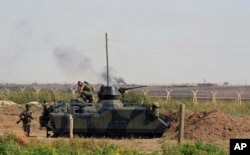For security reasons, Turkey is ratcheting up its threat to intervene militarily against Kurdish forces in Afrin, a Syrian region on Turkey’s border.
Analysts say doing so could potentially bring Turkish forces into a confrontation with the United States and Russia, which back the Kurdish fighters, known as the YPG. Ankara considers the YPG militia, which controls Afrin, of being affiliated with the Kurdistan Workers Party, or PKK, which is waging a Kurdish insurgency inside Turkey.
“Afrin is an obsession at this stage with Turkey,” says political columnist Semih Idiz of Al Monitor website. “Because of its proximity to the Turkish border, and if it remains in the Kurdish hands, it enables the Kurds to have a kind of corridor, which could eventually link with northern Iraq and then have a way to the sea,” he added.
“Whenever a threat is posed to Turkey from Afrin or another region, we will enter without hesitation. We will clean out the terrorists,” warned Turkish Foreign Minister Mevlut Cavusoglu Wednesday. The warning is backed by the steady buildup of Turkish forces on Afrin’s Turkish and Syrian borders.
Ankara tightened its grip around Afrin following a deal with Russia and Iran.
The agreement allowed Turkish forces to enter the nearby Syrian Idlib enclave, controlled by rebel forces fighting the Damascus regime as part of an effort to create a de-escalation zone. Idlib borders Afrin, giving the Turkish forces a key strategic advantage.
“The movement into Idlib, Turkey’s primary aim, is to control Afrin, from the west-southwest,” observes Haldun Solmazturk, head of the 21st Century Turkey Institute, an Ankara-based research group. "Turkish military action and deployments have only served to this aim." Many of the Turkish forces deployed in Idlib are massed on hills overlooking Afrin.
Ankara, however, faces major diplomatic obstacles before it can launch any military operation against Afrin.
“The Kurds are supported by the U.S. and to some extent Russia,” observes columnist Idiz, “if you recall when Turkey acted against the Kurds in Afrin. Russia immediately sent in observers, and deployed them between the Kurdish and Turkish forces.”
Washington’s backing of the YPG forces has been a major point of contention with NATO ally Turkey.
“On the issue of the YPG,Turkey does have a case; at the end of the day this is a security threat for an ally, and the United States at least publicly did not seem to care much about it and at the end of the day that may be really the core matter (of tensions),” notes international relations expert Soli Ozel of Istanbul’s Kadir Has University.
Following a conversation last month between Turkish President Recep Tayyip Erdogan and U.S. President Donald Trump, Ankara said Washington was ready to change its policy of arming theYPG. U.S. Defense Secretary Jim Mattis suggested Washington will move away from arming Syrian Kurdish fighters as part of a wider shift from a military-led to a diplomatic-led approach in Syria.
Ankara opposes the U.S. arming the YPG, which bore the brunt of the fighting to clear Islamic State forces from their self-proclaimed capital in Raqqa, Syria.
Despite the U.S. comments, Erdogan has continued his attacks on Washington. In using an Arabic term to describe Islamic State, Erdogan Sunday told supporters, “Whoever established Daesh and armed them, and wreaked carnage in the country (Syria), is now arming and controlling and guiding YPG.” The comments were widely interpreted as an indirect reference to the U.S.
Analysts suggest Ankara is pressuring Washington in order to gain a freer hand against the YPG; but, even if such pressure succeeds, Moscow remains.
“I don’t really see Russians at least at this juncture letting the Turks enter Afrin and breaking the rule of the YPG there,” said international relations expert Ozel. Russian forces continue to be deployed in the Afrin region. Both Washington and Moscow are continuing to court the Syrian Kurdish forces, which control around a quarter of Syrian territory.
Questions also remain over whether the Turkish military is capable of launching an offensive into Afrin.
“AKP is very open about invading Afrin,” said political consultant Atilla Yesilada of Global Source Partners. “But the Kurdish canton, which is heavily fortified, I am sure, is going to be valiantly protected, which could turn into a bloodbath,” he said.
Much of Afrin is mountainous and the YPG forces have had many years to build up fortifications.
“It’s not feasible at all; there is no legal ground, there is no political ground,” says Solmazturk, who was a former general in counterinsurgency operations. “Militarily, I believe the Turkish army is currently overstretched to intervene militarily into Afrin; the Turkish army is already involved in Iraq, in Syria, in two to three places in Syria.”
Ankara maintains its forces are more than capable of intervening in Afrin. Analysts say the rhetoric may be a way for the ruling AK Party to gain votes as elections are due in two years.







